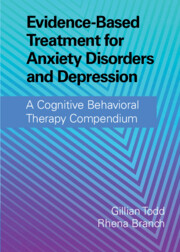 Evidence-Based Treatment for Anxiety Disorders and Depression
Evidence-Based Treatment for Anxiety Disorders and Depression from Part Seven - Future Developments
Published online by Cambridge University Press: 06 January 2022
This chapter discusses how self-esteem is currently defined across common CBT and REBT literature. It aims to establish if there is a clear consensus as to what constitutes low, healthy, and high self-esteem, and implications this may have on clinical practice. Definitions of self-esteem within the DSM-5 and ICD-10 are reviewed, as well as cognitive and affective models of self-esteem. Definitions of self-esteem differ widely both across CBT and REBT as well as within CBT and REBT. Definitions are inconsistent within the DSM-5 and ICD-10. Conflation of beliefs, emotions, and constructs of self-esteem occur across research and within CBT and REBT, but is less frequent in REBT. Inconsistencies are more prevalent within CBT literature, which may be problematic, as points of intervention may therefore differ depending on theoretical understanding and definition of constructs of self-esteem.
To save this book to your Kindle, first ensure no-reply@cambridge.org is added to your Approved Personal Document E-mail List under your Personal Document Settings on the Manage Your Content and Devices page of your Amazon account. Then enter the ‘name’ part of your Kindle email address below. Find out more about saving to your Kindle.
Note you can select to save to either the @free.kindle.com or @kindle.com variations. ‘@free.kindle.com’ emails are free but can only be saved to your device when it is connected to wi-fi. ‘@kindle.com’ emails can be delivered even when you are not connected to wi-fi, but note that service fees apply.
Find out more about the Kindle Personal Document Service.
To save content items to your account, please confirm that you agree to abide by our usage policies. If this is the first time you use this feature, you will be asked to authorise Cambridge Core to connect with your account. Find out more about saving content to Dropbox.
To save content items to your account, please confirm that you agree to abide by our usage policies. If this is the first time you use this feature, you will be asked to authorise Cambridge Core to connect with your account. Find out more about saving content to Google Drive.